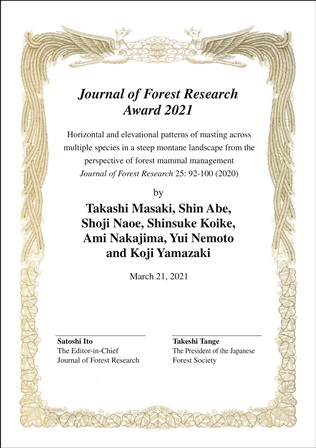Topics
Shinsuke Koike, Professor of GIR, received “Journal of Forest Research Award”
- Media & Awards
- 2021.4.15

Shinsuke Koike, Professor of GIR, received “Journal of Forest Research Award” from The Japanese Forest Society (JFS) on March 21st, 2021.
■Award
Journal of Forest Research Award from The Japanese Forest Society (JFS)
■Outline of the award
Title: “Horizontal and elevational patterns of masting across multiple species in a steep montane landscape from the perspective of forest mammal management”
Award criteria: Journal of Forest Research (JFR) Award is given to authors who have published an original and internationally-outstanding article(s) in JFR that contributes to the academic development of forest science.
Reason for selecting the award recipient: This paper analyzes the horizontal and elevational structures of spatial synchrony of masting of tree fruits, and evaluates the effects of elevation on the movement patterns of Asian black bears. Previous researches have indicated that masting of trees strongly influences the movement patterns of large mammals, however there have been few studies that investigated in the spatial patterns of masting across multiple tree species at spatial scales that reflect the wide home ranges of large mammals. This research investigates fruit production by 403 trees of six species over 10 years within a 30 × 30-km² landscape, as well as the structures of intraspecies and interspecies synchrony. The conclusions drawn from the vast data are extremely reliable and the model approach adopted for the analysis is also far advanced; thus this paper will greatly contribute to the development of related research in the future. Furthermore, based on the findings of fruiting synchrony in this research, this paper provides a scientific basis for the factors behind the changes of Asian black bears’ movement patterns (this movement-pattern change is one of major social issues nowadays). In this sense, this paper is evaluated as one that has a considerable ripple effect on society as well. The conclusions drawn from the vast data are extremely reliable and the model approach adopted for the analysis is also far advanced; thus this paper will greatly contribute to the development of related research in the future. Furthermore, based on the findings of fruiting synchrony in this research, this paper provides a scientific basis for the factors behind the changes of Asian black bears’ movement patterns (this movement-pattern change is one of major social issues nowadays). In this sense, this paper is evaluated as one that has a considerable ripple effect on society as well.
このページの上部へ